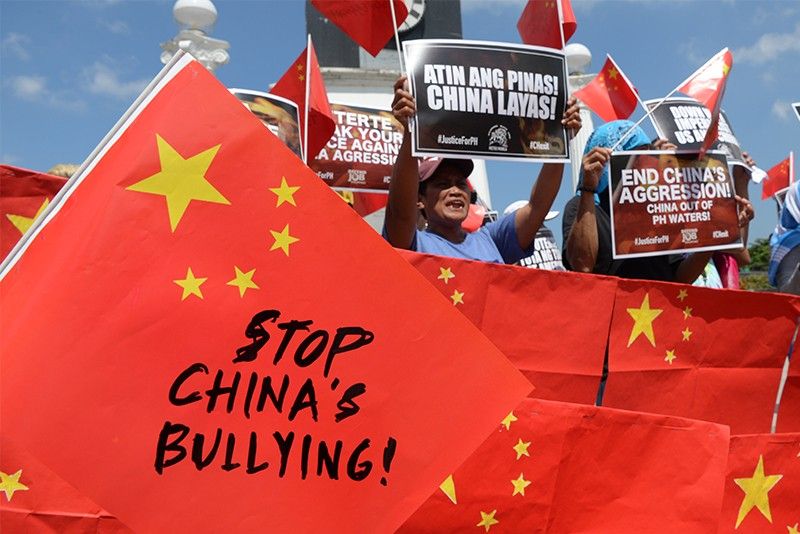Commentary: Inaction in South China Sea ruling is bad governance

It has been four years since the historic 2016 Hague ruling, where the Permanent Court of Arbitration recognized the Philippines' territorial claims in the contested waters in the West Philippine Sea. The arbitral award was seen as a victory of the rule of law and democratic institutions over international strong-arm tactics.
However, four years later, the Duterte administration continues to skirt the issue, shelving the victory, and leaving Filipinos clamoring for the government to do something about China’s continued expansionist tactics in the West Philippine Sea.
According to a Social Weather Station (SWS) survey commissioned by the Stratbase ADR Institute, 7 out of 10 Filipinos agree that the Philippine Government should assert its rights over the islands in the West Philippine Sea. Not only that, but the survey also found that 8 out of 10 Filipinos agree that the Philippines should form alliances with other countries to help defend its rights. The SWS survey also showed that China is the least trusted nation according to Filipinos.
However, these sentiments are not new, since even previous surveys show that Filipinos have voiced their desire for the government to recognize and assert the Hague ruling since it was awarded four years ago.
Yet, even with the public clamor, the Duterte administration, in large part, has chosen to ignore the call for action on the West Philippine Sea issue. Instead, it has allowed China to continue its reclamation activities, exploit resources and deploy vessels in the Philippines’ exclusive economic zone. All this despite campaign promises to assert the Hague ruling, uphold the rule of law and deliver effective and responsive governance.
Through this inaction in the West Philippine Sea, the Duterte administration shows not only that it is unwilling to uphold our sovereignty, but it also demonstrates bad governance.
The Duterte administration’s shelving of the Hague ruling and its adoption of this defeatist attitude towards asserting our sovereignty undermines the rule of law, a cornerstone of good governance. It discards a rules-based international system and replaces it with one based on intimidation, political motivation, and backdoor dealings.
By putting the ruling aside to cozy up to China, the Duterte administration also robbed the Philippines of the chance to build alliances with neighboring claimants and to strengthen relationships with existing allies that would have allowed us to more effectively defend our national interest and security.
Furthermore, by ignoring the call of the Filipino people for its government to assert its rights over the islands in the West Philippine Sea, the administration has also failed to respond to the needs of its citizens. The effects of this lack of responsiveness are felt hardest by our fisherfolk who are now bullied and harassed for fishing in their own waters.
Reacting to the government’s lack of responsiveness, former Department of Foreign Affairs Secretary Albert del Rosario, during a virtual conference organized by the Stratbase ADR Institute, called on the government to take the Award off the shelf, listen to its people and respond to their call for the Philippines to regain control of its sovereign territory.
The conference also brought out the need for strategic partnerships that reinforce the rule of law. Stratbase ADR Institute President Prof. Dindo Manhit, for instance, noted that “our biggest advantage and strength as a small, democratic nation relies in the building of strategic alliances with like-minded states based on shared values and the vision of a rules-based international and regional order.”
This month marked the fourth anniversary of the Philippines’ landmark arbitral victory. And while it is clear, in both law and public sentiment, that the Filipino people yearn to uphold their sovereignty in the West Philippine Sea, our government so far seems unwilling to respond with equal fervor.
That said, the recent statement from the Foreign Affairs Secretary Teodoro Locsin, Jr. reaffirming the "non-negotiable" nature of the award and another statement from National Defense Sec. Delfin N. Lorenzana urging China to comply with the ruling and to abide by the United Nations Convention on the Law of the Seas (UNCLOS) are welcomed developments.
Hopefully, this is more than just lip service to commemorate the anniversary. It is about time that the government steps up and frees itself from this defeatist narrative.
After all, the sentiment of the Filipino people is clear as day. The people yearn for responsive governance that asserts its rights in the West Philippine Sea. They are calling on the government to live up to their mandate, build meaningful alliances, and uphold the rule of law.
The people have spoken. All that is left is for the government to listen and act.
Paco Pangalangan is the executive director of think tank Stratbase ADR Institute.
- Latest




























